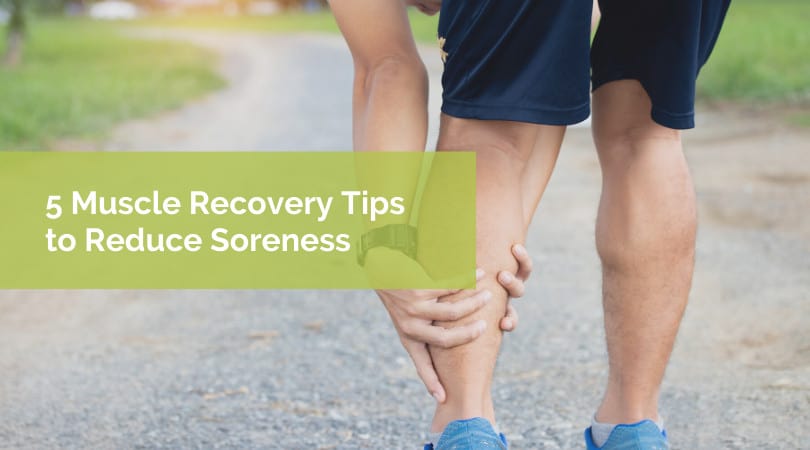
“No pain, no gain” doesn’t always have to be your motto for staying in shape. In fact, too much pain may be detrimental to physical performance. Extreme pain may even come from overworking muscle groups during your workout, which can slow your results. Investing time and thought into your recovery process can help you reach your performance goals faster.
We’ve compiled a few smart recovery tips to help you reduce muscle soreness faster and get you back to doing the activities you love.
Eat Protein and Carbs
Eating a meal that contains both protein and carbohydrates within 2 hours after exercise can boost muscle recovery and restore your used-up glycogen. Your body not only relies on protein to promote muscle growth, but also to support the production of special enzymes that help reduce soreness.
Your body also needs to restore glycogen (or stored carbohydrates) to help build new muscle. When the body has enough stored carbohydrates, it will not breakdown muscle proteins for energy. After all, you want to keep all the muscle you have, right?
The best way to maximize muscle recovery and prevent any breakdown is to eat carbohydrates and protein together immediately after your workout. An example of this could be eating a turkey sandwich on whole wheat bread or eating a protein shake with a banana.
Get Enough Rest at Night
One of the most important things you can do to speed up the muscle soreness recovery process is to get enough rest. While you sleep, your body produces hormones, increases blood flow to your muscles, replenishes your glycogen stores and repairs damaged tissues.
Sleep deprivation can increase the production of hormones that break down muscle. Cortisol, for example, impairs muscle growth and reduces the production of muscle-building hormones, making muscle recovery more difficult to achieve.
According to the National Sleep Foundation, adults between the ages of 26-64 years should aim to get 7-9 hours of sleep nightly. For some athletes, like endurance athletes, sleeping 8-10 hours is recommended to optimize muscle recovery.
To help improve your sleep, reduce bright lights at night, create a calm environment before bedtime and try going to bed at the same time every night.
Stay Hydrated
Dehydration can decrease physical performance and increase muscle recovery time. After a workout, you may think of drinking a glass or two of water because you feel thirsty. However, while plain water is good for quenching thirst, it may not be enough to keep you hydrated.
In fact, plain water may go through you instead of hydrating your cells. To maximize your hydration, combine your water intake with food, or consider a sports drink that contains sodium, chloride and other minerals.
Be careful of your day-to-day fluid choices because they may dehydrate you further. Alcohol is known to be a diuretic and can interfere with the breakdown of lactic acid after physical activity, which will increase your muscle soreness recovery time. If you’re sensitive to caffeine, drinking coffee or other caffeinated beverages after a workout may also have a diuretic effect, making dehydration and soreness worse.
Book a Massage
Delayed onset muscle soreness (otherwise known as DOMS) can happen 12-24 hours after physical activity. Research suggests that massage is an effective way to reduce DOMS because it increases the production of new muscle cells and improves blood flow to muscles. Better circulation through massage can also help eliminate the wastes produced during exercise, like lactic acid.
Invest in a Foam Roller
If a massage isn’t always possible, investing in a foam roller may be a suitable alternative. The pressure generated while using a foam roller is similar to that of a sports massage. A 2015 study looked at the effects of foam rolling on DOMS. Researchers found that foam rolling for 20 minutes immediately after exercise, then every 24 hours, significantly reduced muscle tenderness.
How to Reduce Muscle Soreness
These are just a few simple ways you can try to help reduce muscle soreness after a workout. Eating enough protein and carbs after your workout, staying hydrated, getting enough sleep and getting a massage or using a foam roller can help you recover faster. These may seem simple, but they are effective techniques to get you back into accomplishing your daily goals without feeling sore. The important thing is to find what combination of methods works best for you.
- Persistent Tiredness and Chronic Fatigue: Causes and Symptoms - February 27, 2024
- Can A Protein Shake Replace A Breakfast Meal? - March 2, 2023
- Glutamine After Surgery: Does It Help With Recovery? - February 17, 2023




